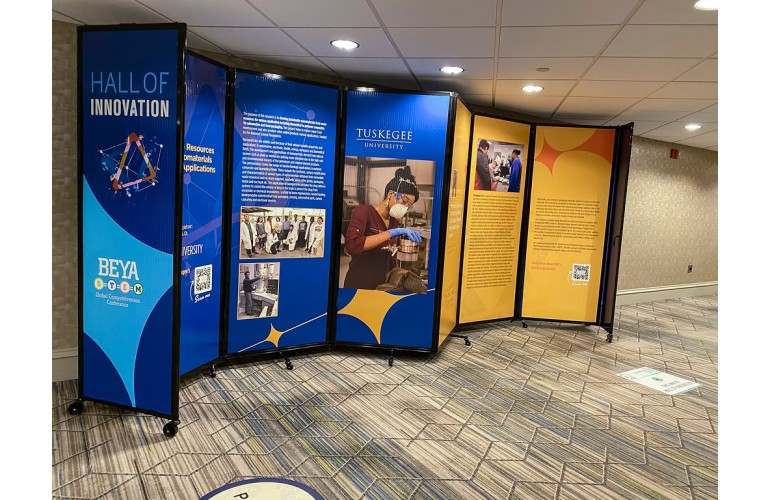 Subscribe
Subscribe- Login
-
/
Sign Up
- US Black Engineer
- >>
- News
- >>
- Stand Up, Step Up, and Make Sustainable Change: The Opportunity of Our Institutions
For more than 35 years, academic deans at ABET-accredited engineering schools in historically Black colleges and universities have come together at the BEYA Conference to discuss issues in science, technology, engineering, and math (STEM) education. Topics range from the goals and accomplishments of their respective schools to the challenges they share.
Earlier this year, all 15 deans in the Council of Engineering Deans of the Historically Black Colleges and Universities (HBCUs) shared one obvious challenge: the effects of COVID-19. Its impact on enrollment, budgets, and community wellness could not be ignored.
But, as the event’s theme—Stand Up, Step Up, and Make Sustainable Change: The Opportunity of Our Institutions —illustrated, these deans faced the pandemic head-on, embracing the challenges as a chance to innovate, evolve, and engineer new and unexpected solutions.
All the participants spoke of their struggles teaching courses, which are often experience-based and require hands-on experimentation, in a socially distanced world.
“Hands-on experience is an effective way to translate abstract concepts into visual and physical manifestations,” said Dr. Ben Oni, interim dean of the College of Engineering at Tuskegee University. “Losing that to COVID was very bad, but we’re finding ways to work through it.”
Dr. Devdas Shetty, dean of the School of Engineering and Applied Sciences at the University of the District of Columbia added, “The challenge is what to do when we can’t run our face-to-face courses, labs, and research. Students have missed the opportunity to come together for senior projects, group chats, and one-on-one interactions.”
The 15 HBCU engineering schools tackled this problem in several ways. For Shetty’s institution, it involved “work[ing] round the clock with our graduate students to build a very organized virtual tutorial system.”
Others, such as Dr. John Anderson and the College of Engineering and Architecture at Howard University, brought the lab to their students. “We’re fortunate to have an industry partner assisting us in sending lab kits to every student,” he said.
While he and other deans admitted that there were challenges in adjusting (lost packages, international shipping, etc.), it demonstrates how schools are striving to continue providing top-tier education. The problems (and solutions) are not just logistic, though.
Dr. Oscar Barton, dean of the School of Engineering at Morgan State University, spoke about his responsibility to help his community stay connected. “We made it a priority to ensure that our students and faculty were well aware of our counseling services,” he says. “I encouraged all of the faculty to have ‘Let’s Talk’ sessions with students to learn about their concerns so we can find ways to alleviate those concerns.”
As leaders of educational institutions, their primary mission is to send diverse and workforce-ready graduates out into the world, and each of their schools has a reputation for achieving that goal.
“We produced the state of Alabama’s first African American female Ph.D. in physics,” said Dr. ZT Deng, interim dean for Alabama A&M’s College of Engineering Technology and Physical Sciences. “And we hope to continue achieving great things like that.”
In one part of the Dean’s Roundtable discussion, the deans took turns illustrating the significant ways in which HBCUs contribute to the nation. Some are proudest of their research facilities.
The College of Science and Engineering at Southern University and A&M College is led by Dr. Patrick Carriere. The college is home to the largest 3D printing lab in the state of Louisiana.
Others, such as Dr. Joyce Shirazi of Hampton University’s School of Engineering and Technology, are proudest of their student success rates.
“Every 2019 graduate of our chemical engineering department went on to a doctoral program in chemical engineering,” she said, adding that in a recent academic year, Hampton graduated two of the country’s four female African American chemical engineering PhDs.
A few deans cited their school’s community outreach and partnership programs. For example, Dr. Michael Keeve of Norfolk State University described working on training veterans for jobs in nanotechnology. Dr. Robin Coger of North Carolina A&T University explained that her engineering college is working with the city and state transportation department on autonomous vehicle research. Meanwhile, Dr. Wilbur Walters of Jackson State University spoke about how his college is engaged with local public schools to “strengthen the pipeline between K-12 and our science and engineering fields.
Dr. S. Keith Hargrove of Tennessee State University spoke proudly about his schools’ collaborations with military organizations, noting how happy they are to be contributing to national security efforts.
Speaking about the Tennessee State Cybersecurity Education Diversity Initiative (CEDA), Hargrove said “the purpose is to prepare students to work for government cybersecurity organizations. We’re excited about the alliance between HBCUs and defense organizations, and we’re proud to be able to produce graduates to go into this high-need field.”
Dr. Derek Dunn of the University of Maryland Eastern Shore echoed that sentiment in discussing his school’s pipeline partnership with the Air Force ROTC. “We’re proud to be training the next generation of pilots to defend our nation,” he said.
Although COVID had adverse effects on higher education, the deans make it clear they continued producing groundbreaking research and valuable graduates.
Summarizing the overall message of the panel, Dr. J. Murray Gibson of the FAMU-FSU College of Engineering said, “I think all of us have found ways to continue to do what we do, teaching and researching in this environment. There are positives and negatives…but [our schools] have demonstrated amazing resilience.”

